Feminist Theory Essay: Exploring History, Masculinism, and Limitations
VerifiedAdded on 2022/12/22
|7
|2016
|46
Essay
AI Summary
This essay provides a comprehensive overview of feminist theory, tracing its historical development and examining its core tenets. It delves into the theory's role in understanding gender inequality, exploring concepts such as structural and cultural feminism, and contrasting it with masculinism theory. The essay also analyzes the limitations of feminist theory, highlighting areas of debate and critique. Furthermore, it discusses the evolution of feminist waves and the importance of considering the psychological development of women within the context of counselling. The essay emphasizes how feminist theory shifts perspectives, illuminating social problems and trends related to gender and discrimination, ultimately aiming to promote equality and justice.
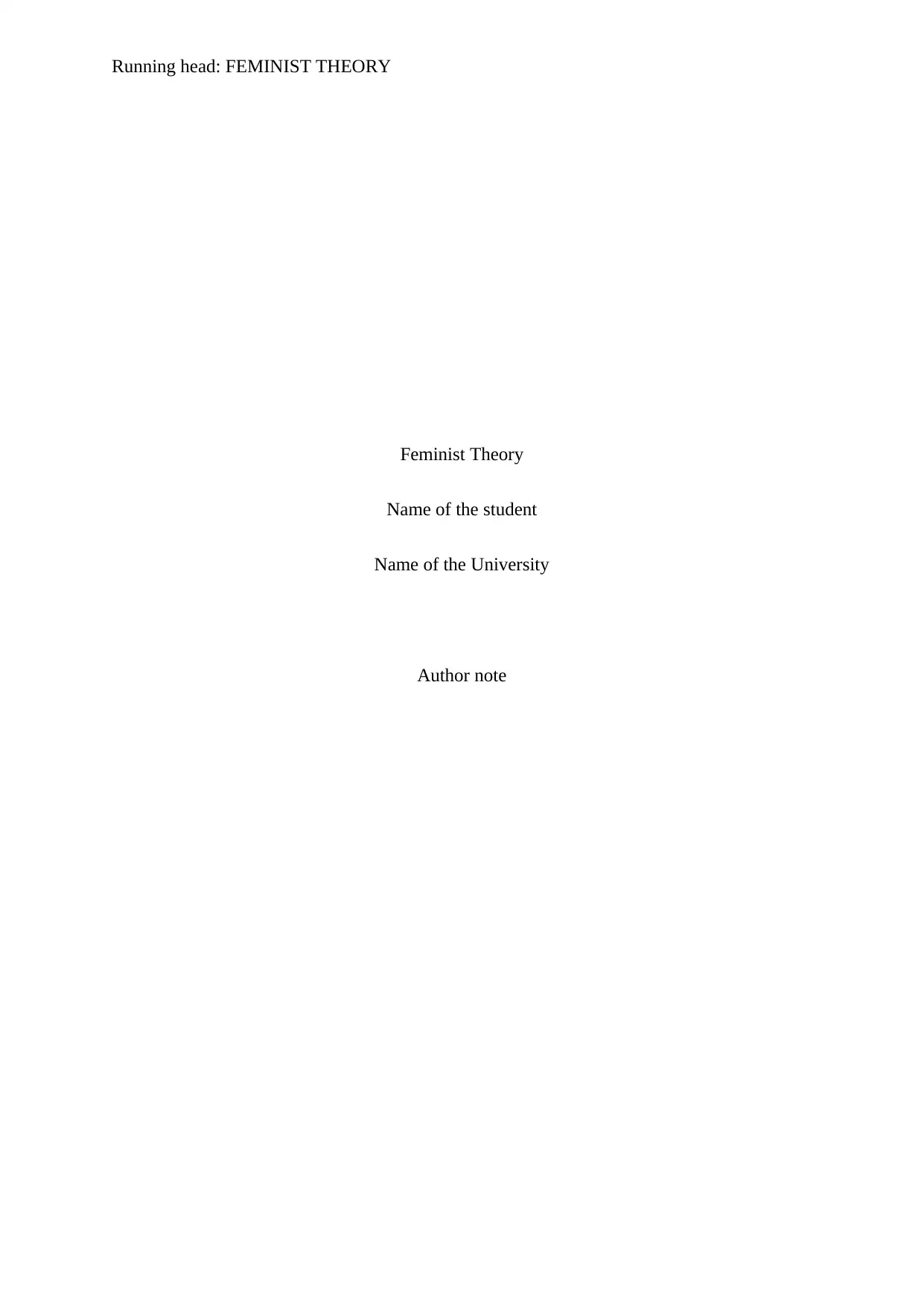
Running head: FEMINIST THEORY
Feminist Theory
Name of the student
Name of the University
Author note
Feminist Theory
Name of the student
Name of the University
Author note
Paraphrase This Document
Need a fresh take? Get an instant paraphrase of this document with our AI Paraphraser
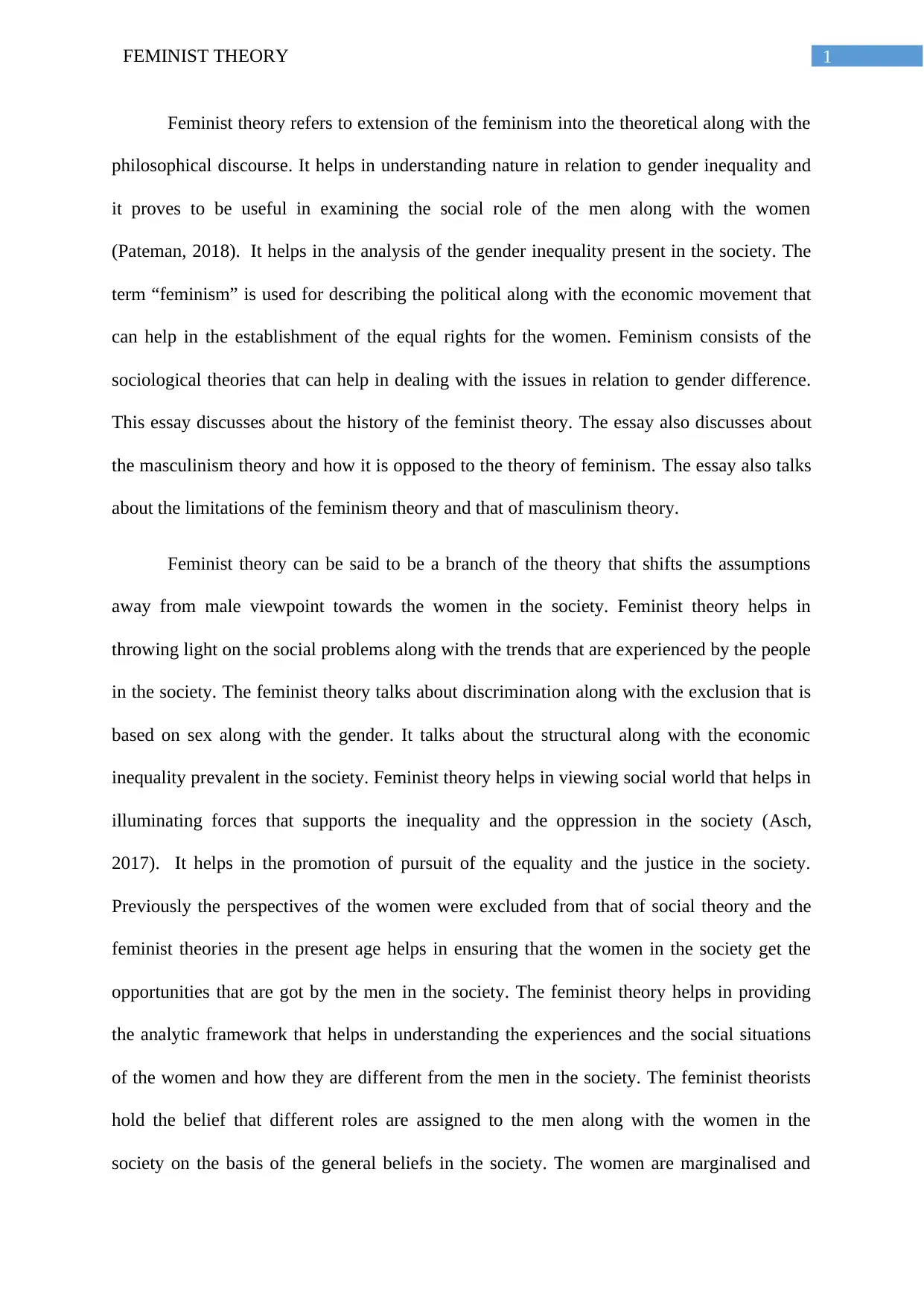
1FEMINIST THEORY
Feminist theory refers to extension of the feminism into the theoretical along with the
philosophical discourse. It helps in understanding nature in relation to gender inequality and
it proves to be useful in examining the social role of the men along with the women
(Pateman, 2018). It helps in the analysis of the gender inequality present in the society. The
term “feminism” is used for describing the political along with the economic movement that
can help in the establishment of the equal rights for the women. Feminism consists of the
sociological theories that can help in dealing with the issues in relation to gender difference.
This essay discusses about the history of the feminist theory. The essay also discusses about
the masculinism theory and how it is opposed to the theory of feminism. The essay also talks
about the limitations of the feminism theory and that of masculinism theory.
Feminist theory can be said to be a branch of the theory that shifts the assumptions
away from male viewpoint towards the women in the society. Feminist theory helps in
throwing light on the social problems along with the trends that are experienced by the people
in the society. The feminist theory talks about discrimination along with the exclusion that is
based on sex along with the gender. It talks about the structural along with the economic
inequality prevalent in the society. Feminist theory helps in viewing social world that helps in
illuminating forces that supports the inequality and the oppression in the society (Asch,
2017). It helps in the promotion of pursuit of the equality and the justice in the society.
Previously the perspectives of the women were excluded from that of social theory and the
feminist theories in the present age helps in ensuring that the women in the society get the
opportunities that are got by the men in the society. The feminist theory helps in providing
the analytic framework that helps in understanding the experiences and the social situations
of the women and how they are different from the men in the society. The feminist theorists
hold the belief that different roles are assigned to the men along with the women in the
society on the basis of the general beliefs in the society. The women are marginalised and
Feminist theory refers to extension of the feminism into the theoretical along with the
philosophical discourse. It helps in understanding nature in relation to gender inequality and
it proves to be useful in examining the social role of the men along with the women
(Pateman, 2018). It helps in the analysis of the gender inequality present in the society. The
term “feminism” is used for describing the political along with the economic movement that
can help in the establishment of the equal rights for the women. Feminism consists of the
sociological theories that can help in dealing with the issues in relation to gender difference.
This essay discusses about the history of the feminist theory. The essay also discusses about
the masculinism theory and how it is opposed to the theory of feminism. The essay also talks
about the limitations of the feminism theory and that of masculinism theory.
Feminist theory can be said to be a branch of the theory that shifts the assumptions
away from male viewpoint towards the women in the society. Feminist theory helps in
throwing light on the social problems along with the trends that are experienced by the people
in the society. The feminist theory talks about discrimination along with the exclusion that is
based on sex along with the gender. It talks about the structural along with the economic
inequality prevalent in the society. Feminist theory helps in viewing social world that helps in
illuminating forces that supports the inequality and the oppression in the society (Asch,
2017). It helps in the promotion of pursuit of the equality and the justice in the society.
Previously the perspectives of the women were excluded from that of social theory and the
feminist theories in the present age helps in ensuring that the women in the society get the
opportunities that are got by the men in the society. The feminist theory helps in providing
the analytic framework that helps in understanding the experiences and the social situations
of the women and how they are different from the men in the society. The feminist theorists
hold the belief that different roles are assigned to the men along with the women in the
society on the basis of the general beliefs in the society. The women are marginalised and
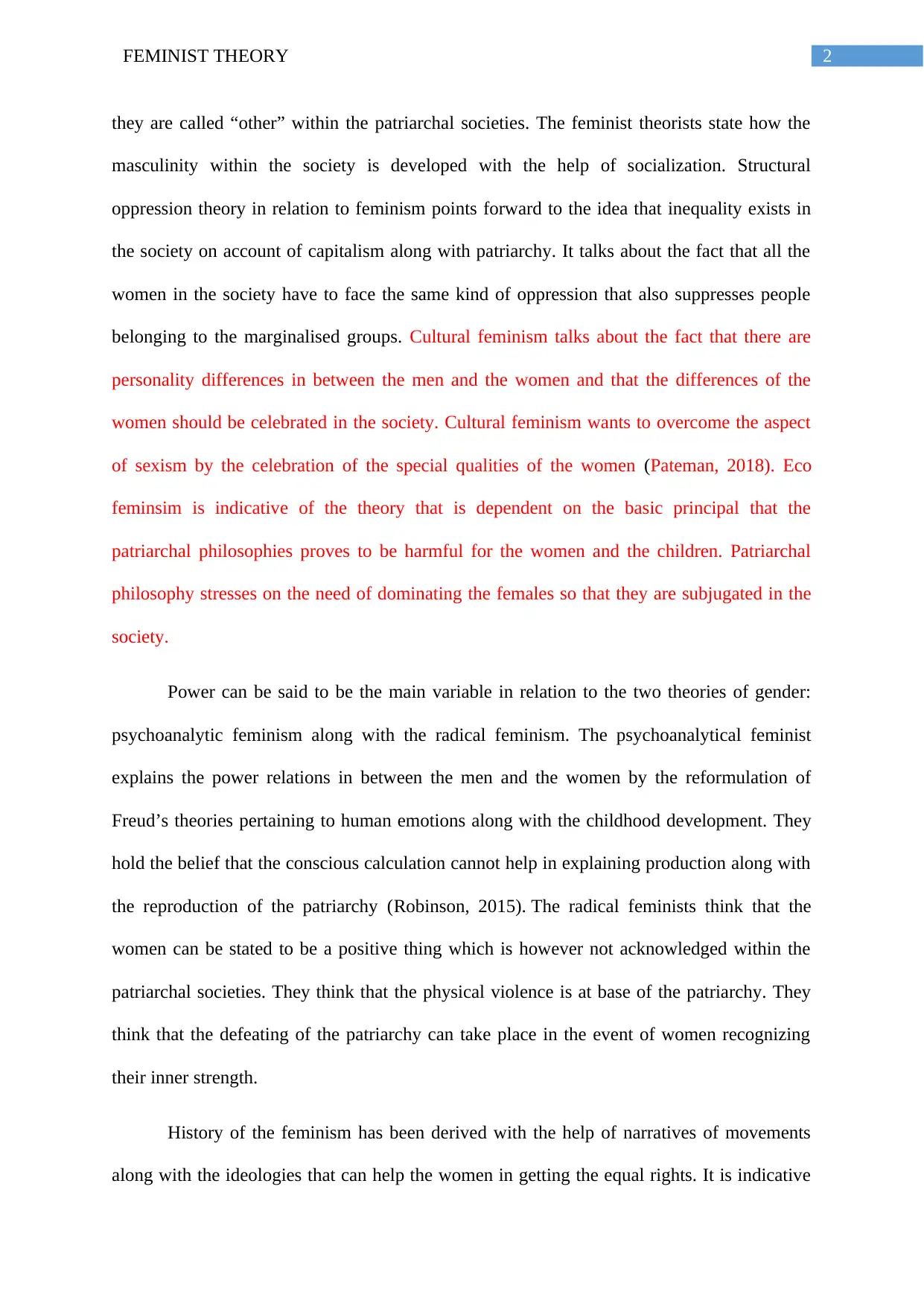
2FEMINIST THEORY
they are called “other” within the patriarchal societies. The feminist theorists state how the
masculinity within the society is developed with the help of socialization. Structural
oppression theory in relation to feminism points forward to the idea that inequality exists in
the society on account of capitalism along with patriarchy. It talks about the fact that all the
women in the society have to face the same kind of oppression that also suppresses people
belonging to the marginalised groups. Cultural feminism talks about the fact that there are
personality differences in between the men and the women and that the differences of the
women should be celebrated in the society. Cultural feminism wants to overcome the aspect
of sexism by the celebration of the special qualities of the women (Pateman, 2018). Eco
feminsim is indicative of the theory that is dependent on the basic principal that the
patriarchal philosophies proves to be harmful for the women and the children. Patriarchal
philosophy stresses on the need of dominating the females so that they are subjugated in the
society.
Power can be said to be the main variable in relation to the two theories of gender:
psychoanalytic feminism along with the radical feminism. The psychoanalytical feminist
explains the power relations in between the men and the women by the reformulation of
Freud’s theories pertaining to human emotions along with the childhood development. They
hold the belief that the conscious calculation cannot help in explaining production along with
the reproduction of the patriarchy (Robinson, 2015). The radical feminists think that the
women can be stated to be a positive thing which is however not acknowledged within the
patriarchal societies. They think that the physical violence is at base of the patriarchy. They
think that the defeating of the patriarchy can take place in the event of women recognizing
their inner strength.
History of the feminism has been derived with the help of narratives of movements
along with the ideologies that can help the women in getting the equal rights. It is indicative
they are called “other” within the patriarchal societies. The feminist theorists state how the
masculinity within the society is developed with the help of socialization. Structural
oppression theory in relation to feminism points forward to the idea that inequality exists in
the society on account of capitalism along with patriarchy. It talks about the fact that all the
women in the society have to face the same kind of oppression that also suppresses people
belonging to the marginalised groups. Cultural feminism talks about the fact that there are
personality differences in between the men and the women and that the differences of the
women should be celebrated in the society. Cultural feminism wants to overcome the aspect
of sexism by the celebration of the special qualities of the women (Pateman, 2018). Eco
feminsim is indicative of the theory that is dependent on the basic principal that the
patriarchal philosophies proves to be harmful for the women and the children. Patriarchal
philosophy stresses on the need of dominating the females so that they are subjugated in the
society.
Power can be said to be the main variable in relation to the two theories of gender:
psychoanalytic feminism along with the radical feminism. The psychoanalytical feminist
explains the power relations in between the men and the women by the reformulation of
Freud’s theories pertaining to human emotions along with the childhood development. They
hold the belief that the conscious calculation cannot help in explaining production along with
the reproduction of the patriarchy (Robinson, 2015). The radical feminists think that the
women can be stated to be a positive thing which is however not acknowledged within the
patriarchal societies. They think that the physical violence is at base of the patriarchy. They
think that the defeating of the patriarchy can take place in the event of women recognizing
their inner strength.
History of the feminism has been derived with the help of narratives of movements
along with the ideologies that can help the women in getting the equal rights. It is indicative
⊘ This is a preview!⊘
Do you want full access?
Subscribe today to unlock all pages.

Trusted by 1+ million students worldwide
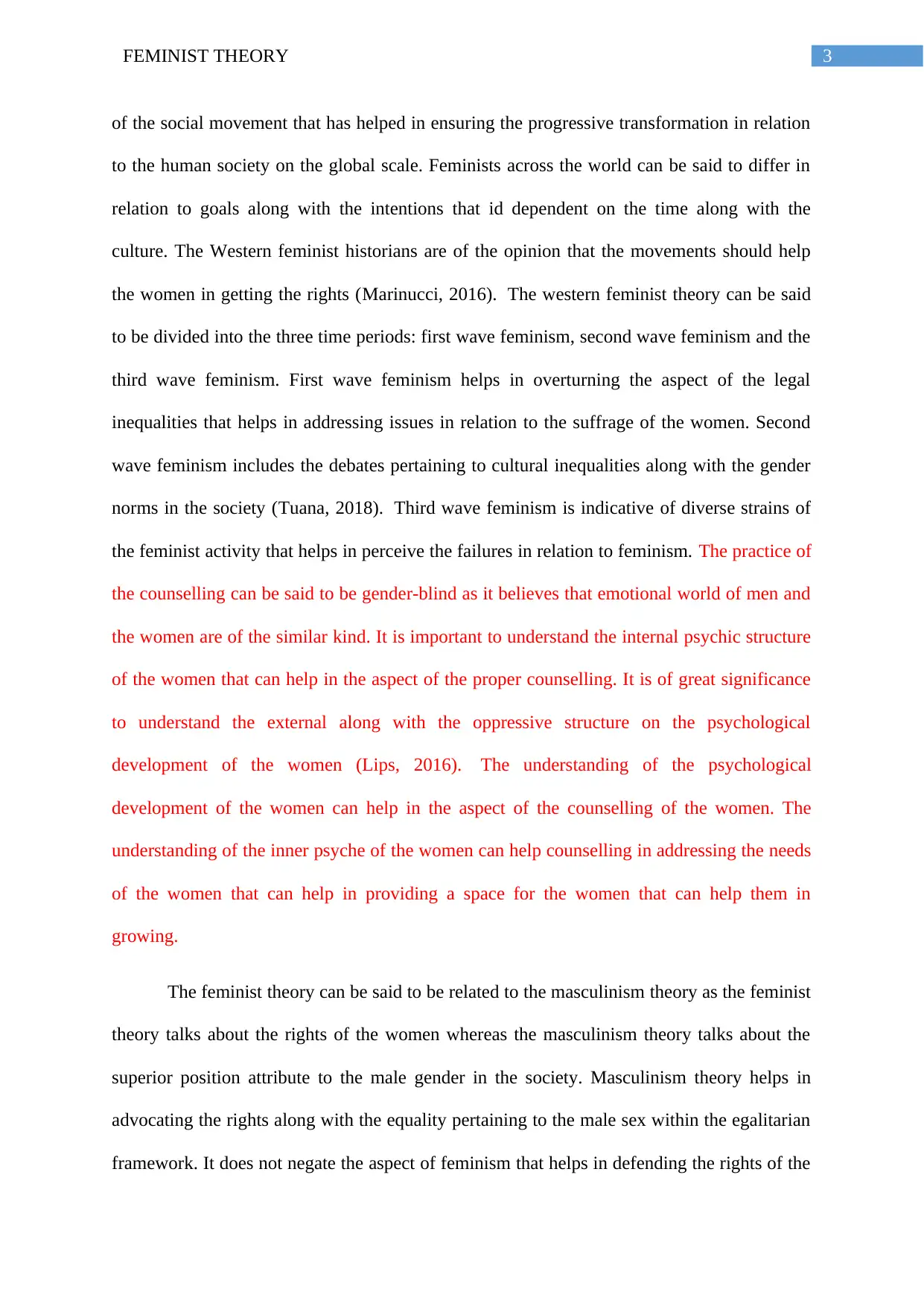
3FEMINIST THEORY
of the social movement that has helped in ensuring the progressive transformation in relation
to the human society on the global scale. Feminists across the world can be said to differ in
relation to goals along with the intentions that id dependent on the time along with the
culture. The Western feminist historians are of the opinion that the movements should help
the women in getting the rights (Marinucci, 2016). The western feminist theory can be said
to be divided into the three time periods: first wave feminism, second wave feminism and the
third wave feminism. First wave feminism helps in overturning the aspect of the legal
inequalities that helps in addressing issues in relation to the suffrage of the women. Second
wave feminism includes the debates pertaining to cultural inequalities along with the gender
norms in the society (Tuana, 2018). Third wave feminism is indicative of diverse strains of
the feminist activity that helps in perceive the failures in relation to feminism. The practice of
the counselling can be said to be gender-blind as it believes that emotional world of men and
the women are of the similar kind. It is important to understand the internal psychic structure
of the women that can help in the aspect of the proper counselling. It is of great significance
to understand the external along with the oppressive structure on the psychological
development of the women (Lips, 2016). The understanding of the psychological
development of the women can help in the aspect of the counselling of the women. The
understanding of the inner psyche of the women can help counselling in addressing the needs
of the women that can help in providing a space for the women that can help them in
growing.
The feminist theory can be said to be related to the masculinism theory as the feminist
theory talks about the rights of the women whereas the masculinism theory talks about the
superior position attribute to the male gender in the society. Masculinism theory helps in
advocating the rights along with the equality pertaining to the male sex within the egalitarian
framework. It does not negate the aspect of feminism that helps in defending the rights of the
of the social movement that has helped in ensuring the progressive transformation in relation
to the human society on the global scale. Feminists across the world can be said to differ in
relation to goals along with the intentions that id dependent on the time along with the
culture. The Western feminist historians are of the opinion that the movements should help
the women in getting the rights (Marinucci, 2016). The western feminist theory can be said
to be divided into the three time periods: first wave feminism, second wave feminism and the
third wave feminism. First wave feminism helps in overturning the aspect of the legal
inequalities that helps in addressing issues in relation to the suffrage of the women. Second
wave feminism includes the debates pertaining to cultural inequalities along with the gender
norms in the society (Tuana, 2018). Third wave feminism is indicative of diverse strains of
the feminist activity that helps in perceive the failures in relation to feminism. The practice of
the counselling can be said to be gender-blind as it believes that emotional world of men and
the women are of the similar kind. It is important to understand the internal psychic structure
of the women that can help in the aspect of the proper counselling. It is of great significance
to understand the external along with the oppressive structure on the psychological
development of the women (Lips, 2016). The understanding of the psychological
development of the women can help in the aspect of the counselling of the women. The
understanding of the inner psyche of the women can help counselling in addressing the needs
of the women that can help in providing a space for the women that can help them in
growing.
The feminist theory can be said to be related to the masculinism theory as the feminist
theory talks about the rights of the women whereas the masculinism theory talks about the
superior position attribute to the male gender in the society. Masculinism theory helps in
advocating the rights along with the equality pertaining to the male sex within the egalitarian
framework. It does not negate the aspect of feminism that helps in defending the rights of the
Paraphrase This Document
Need a fresh take? Get an instant paraphrase of this document with our AI Paraphraser
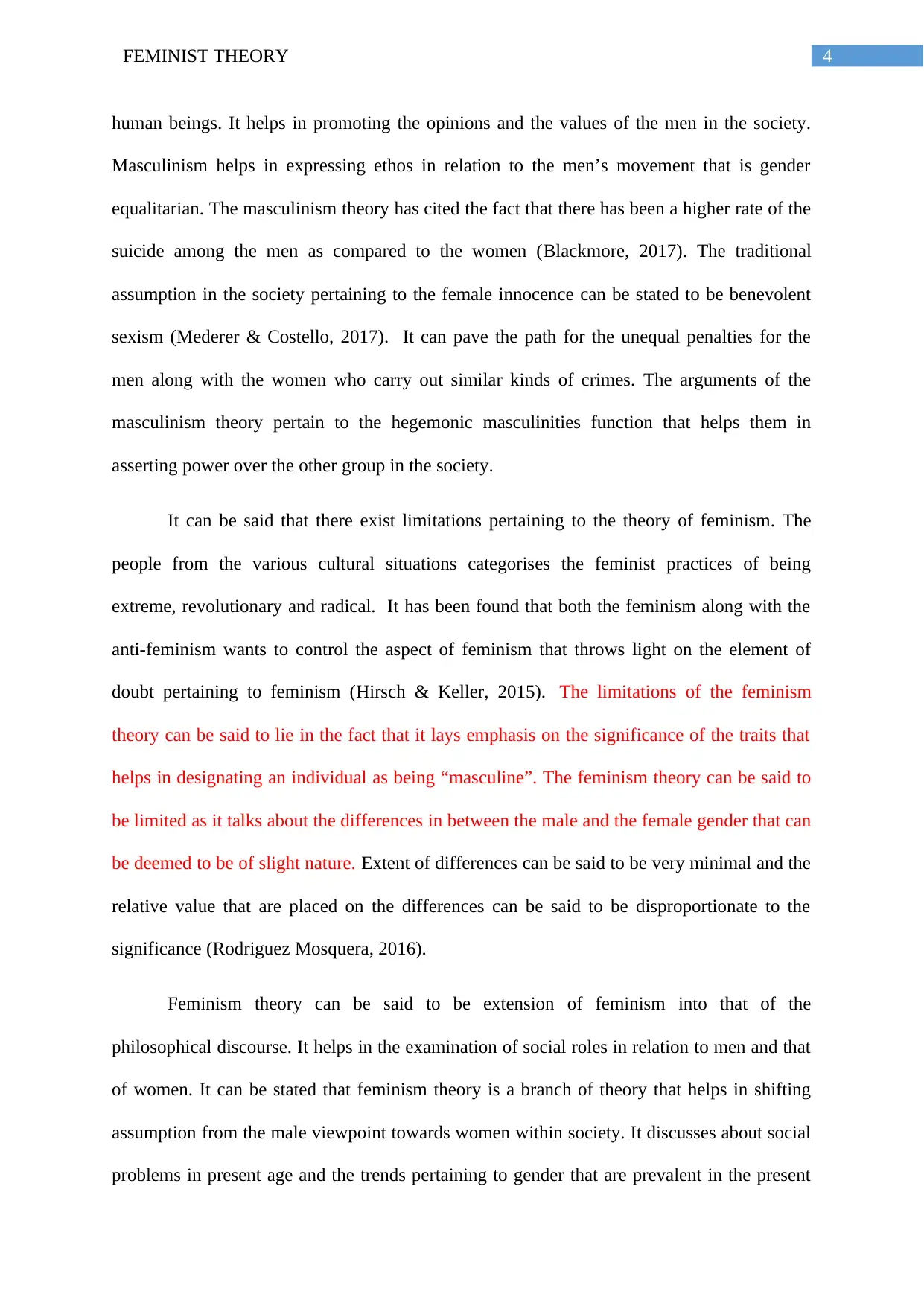
4FEMINIST THEORY
human beings. It helps in promoting the opinions and the values of the men in the society.
Masculinism helps in expressing ethos in relation to the men’s movement that is gender
equalitarian. The masculinism theory has cited the fact that there has been a higher rate of the
suicide among the men as compared to the women (Blackmore, 2017). The traditional
assumption in the society pertaining to the female innocence can be stated to be benevolent
sexism (Mederer & Costello, 2017). It can pave the path for the unequal penalties for the
men along with the women who carry out similar kinds of crimes. The arguments of the
masculinism theory pertain to the hegemonic masculinities function that helps them in
asserting power over the other group in the society.
It can be said that there exist limitations pertaining to the theory of feminism. The
people from the various cultural situations categorises the feminist practices of being
extreme, revolutionary and radical. It has been found that both the feminism along with the
anti-feminism wants to control the aspect of feminism that throws light on the element of
doubt pertaining to feminism (Hirsch & Keller, 2015). The limitations of the feminism
theory can be said to lie in the fact that it lays emphasis on the significance of the traits that
helps in designating an individual as being “masculine”. The feminism theory can be said to
be limited as it talks about the differences in between the male and the female gender that can
be deemed to be of slight nature. Extent of differences can be said to be very minimal and the
relative value that are placed on the differences can be said to be disproportionate to the
significance (Rodriguez Mosquera, 2016).
Feminism theory can be said to be extension of feminism into that of the
philosophical discourse. It helps in the examination of social roles in relation to men and that
of women. It can be stated that feminism theory is a branch of theory that helps in shifting
assumption from the male viewpoint towards women within society. It discusses about social
problems in present age and the trends pertaining to gender that are prevalent in the present
human beings. It helps in promoting the opinions and the values of the men in the society.
Masculinism helps in expressing ethos in relation to the men’s movement that is gender
equalitarian. The masculinism theory has cited the fact that there has been a higher rate of the
suicide among the men as compared to the women (Blackmore, 2017). The traditional
assumption in the society pertaining to the female innocence can be stated to be benevolent
sexism (Mederer & Costello, 2017). It can pave the path for the unequal penalties for the
men along with the women who carry out similar kinds of crimes. The arguments of the
masculinism theory pertain to the hegemonic masculinities function that helps them in
asserting power over the other group in the society.
It can be said that there exist limitations pertaining to the theory of feminism. The
people from the various cultural situations categorises the feminist practices of being
extreme, revolutionary and radical. It has been found that both the feminism along with the
anti-feminism wants to control the aspect of feminism that throws light on the element of
doubt pertaining to feminism (Hirsch & Keller, 2015). The limitations of the feminism
theory can be said to lie in the fact that it lays emphasis on the significance of the traits that
helps in designating an individual as being “masculine”. The feminism theory can be said to
be limited as it talks about the differences in between the male and the female gender that can
be deemed to be of slight nature. Extent of differences can be said to be very minimal and the
relative value that are placed on the differences can be said to be disproportionate to the
significance (Rodriguez Mosquera, 2016).
Feminism theory can be said to be extension of feminism into that of the
philosophical discourse. It helps in the examination of social roles in relation to men and that
of women. It can be stated that feminism theory is a branch of theory that helps in shifting
assumption from the male viewpoint towards women within society. It discusses about social
problems in present age and the trends pertaining to gender that are prevalent in the present
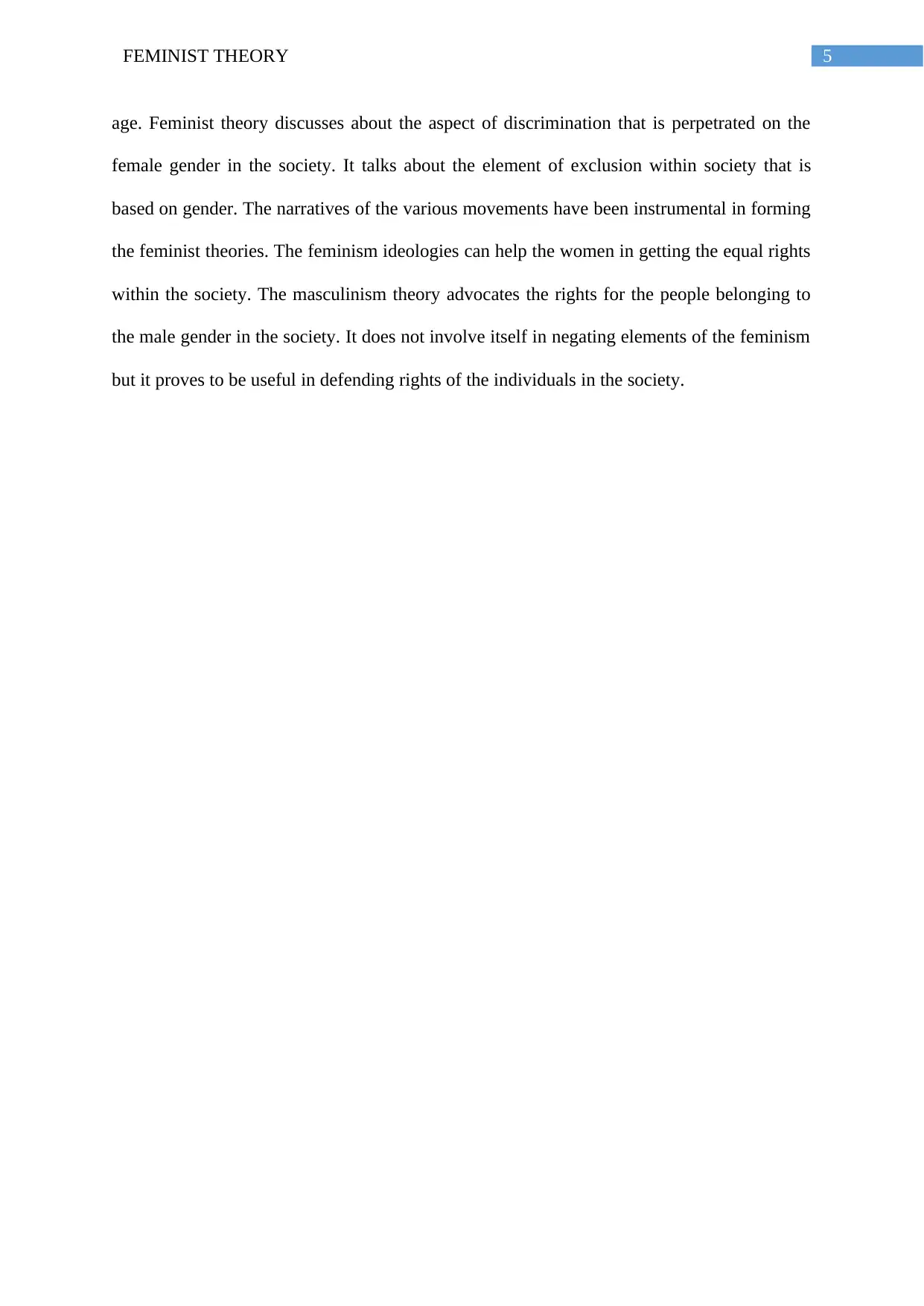
5FEMINIST THEORY
age. Feminist theory discusses about the aspect of discrimination that is perpetrated on the
female gender in the society. It talks about the element of exclusion within society that is
based on gender. The narratives of the various movements have been instrumental in forming
the feminist theories. The feminism ideologies can help the women in getting the equal rights
within the society. The masculinism theory advocates the rights for the people belonging to
the male gender in the society. It does not involve itself in negating elements of the feminism
but it proves to be useful in defending rights of the individuals in the society.
age. Feminist theory discusses about the aspect of discrimination that is perpetrated on the
female gender in the society. It talks about the element of exclusion within society that is
based on gender. The narratives of the various movements have been instrumental in forming
the feminist theories. The feminism ideologies can help the women in getting the equal rights
within the society. The masculinism theory advocates the rights for the people belonging to
the male gender in the society. It does not involve itself in negating elements of the feminism
but it proves to be useful in defending rights of the individuals in the society.
⊘ This is a preview!⊘
Do you want full access?
Subscribe today to unlock all pages.

Trusted by 1+ million students worldwide
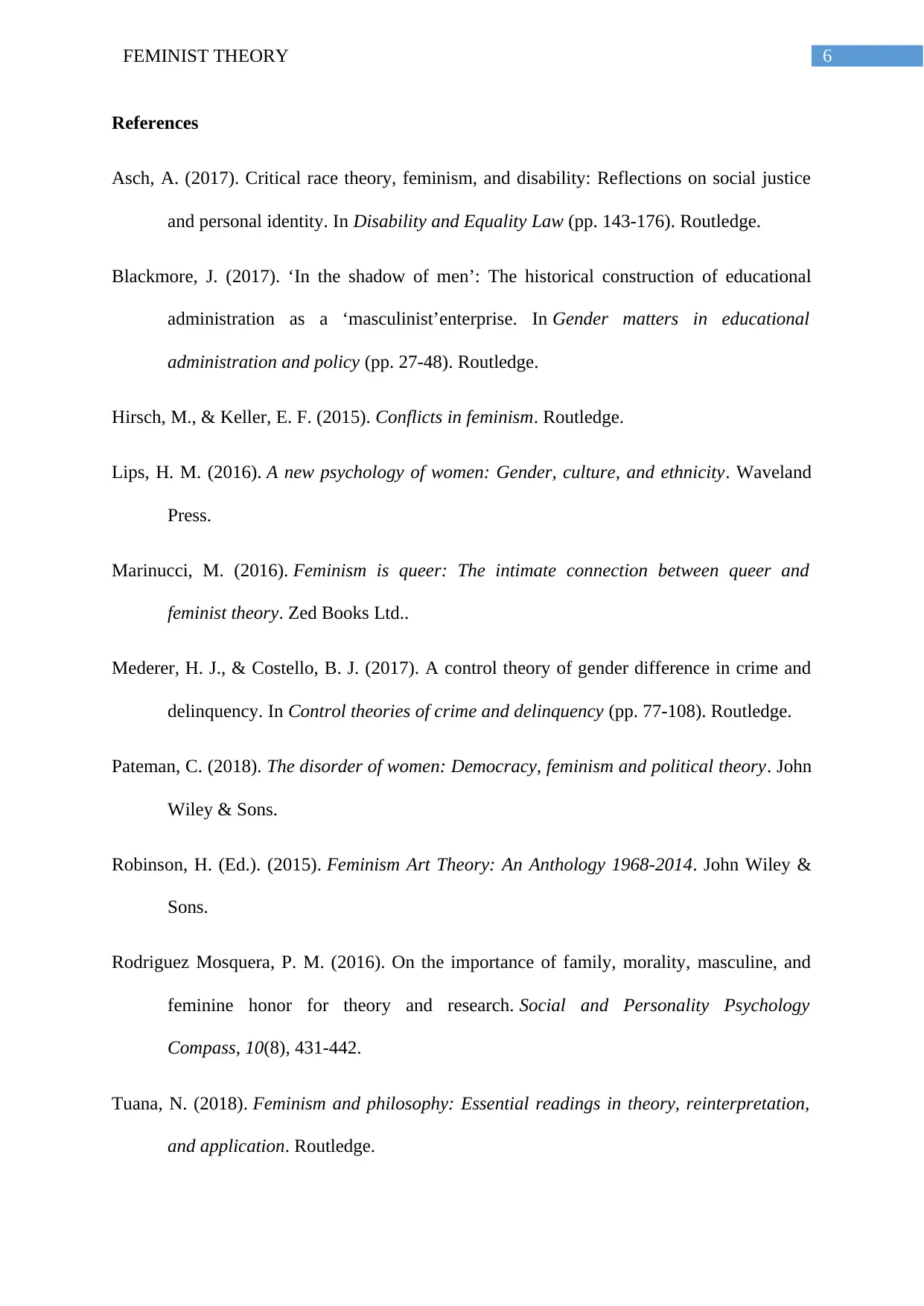
6FEMINIST THEORY
References
Asch, A. (2017). Critical race theory, feminism, and disability: Reflections on social justice
and personal identity. In Disability and Equality Law (pp. 143-176). Routledge.
Blackmore, J. (2017). ‘In the shadow of men’: The historical construction of educational
administration as a ‘masculinist’enterprise. In Gender matters in educational
administration and policy (pp. 27-48). Routledge.
Hirsch, M., & Keller, E. F. (2015). Conflicts in feminism. Routledge.
Lips, H. M. (2016). A new psychology of women: Gender, culture, and ethnicity. Waveland
Press.
Marinucci, M. (2016). Feminism is queer: The intimate connection between queer and
feminist theory. Zed Books Ltd..
Mederer, H. J., & Costello, B. J. (2017). A control theory of gender difference in crime and
delinquency. In Control theories of crime and delinquency (pp. 77-108). Routledge.
Pateman, C. (2018). The disorder of women: Democracy, feminism and political theory. John
Wiley & Sons.
Robinson, H. (Ed.). (2015). Feminism Art Theory: An Anthology 1968-2014. John Wiley &
Sons.
Rodriguez Mosquera, P. M. (2016). On the importance of family, morality, masculine, and
feminine honor for theory and research. Social and Personality Psychology
Compass, 10(8), 431-442.
Tuana, N. (2018). Feminism and philosophy: Essential readings in theory, reinterpretation,
and application. Routledge.
References
Asch, A. (2017). Critical race theory, feminism, and disability: Reflections on social justice
and personal identity. In Disability and Equality Law (pp. 143-176). Routledge.
Blackmore, J. (2017). ‘In the shadow of men’: The historical construction of educational
administration as a ‘masculinist’enterprise. In Gender matters in educational
administration and policy (pp. 27-48). Routledge.
Hirsch, M., & Keller, E. F. (2015). Conflicts in feminism. Routledge.
Lips, H. M. (2016). A new psychology of women: Gender, culture, and ethnicity. Waveland
Press.
Marinucci, M. (2016). Feminism is queer: The intimate connection between queer and
feminist theory. Zed Books Ltd..
Mederer, H. J., & Costello, B. J. (2017). A control theory of gender difference in crime and
delinquency. In Control theories of crime and delinquency (pp. 77-108). Routledge.
Pateman, C. (2018). The disorder of women: Democracy, feminism and political theory. John
Wiley & Sons.
Robinson, H. (Ed.). (2015). Feminism Art Theory: An Anthology 1968-2014. John Wiley &
Sons.
Rodriguez Mosquera, P. M. (2016). On the importance of family, morality, masculine, and
feminine honor for theory and research. Social and Personality Psychology
Compass, 10(8), 431-442.
Tuana, N. (2018). Feminism and philosophy: Essential readings in theory, reinterpretation,
and application. Routledge.
1 out of 7
Related Documents
Your All-in-One AI-Powered Toolkit for Academic Success.
+13062052269
info@desklib.com
Available 24*7 on WhatsApp / Email
![[object Object]](/_next/static/media/star-bottom.7253800d.svg)
Unlock your academic potential
Copyright © 2020–2026 A2Z Services. All Rights Reserved. Developed and managed by ZUCOL.





